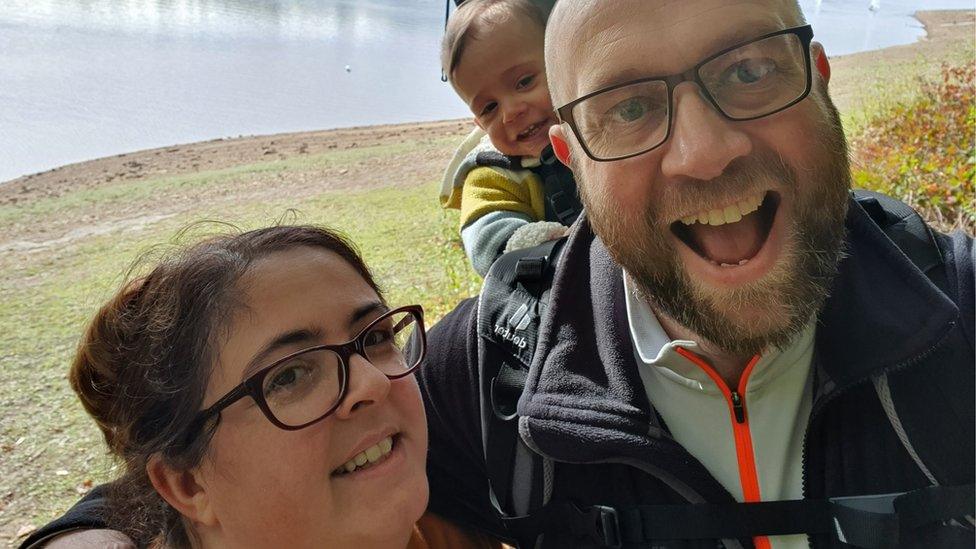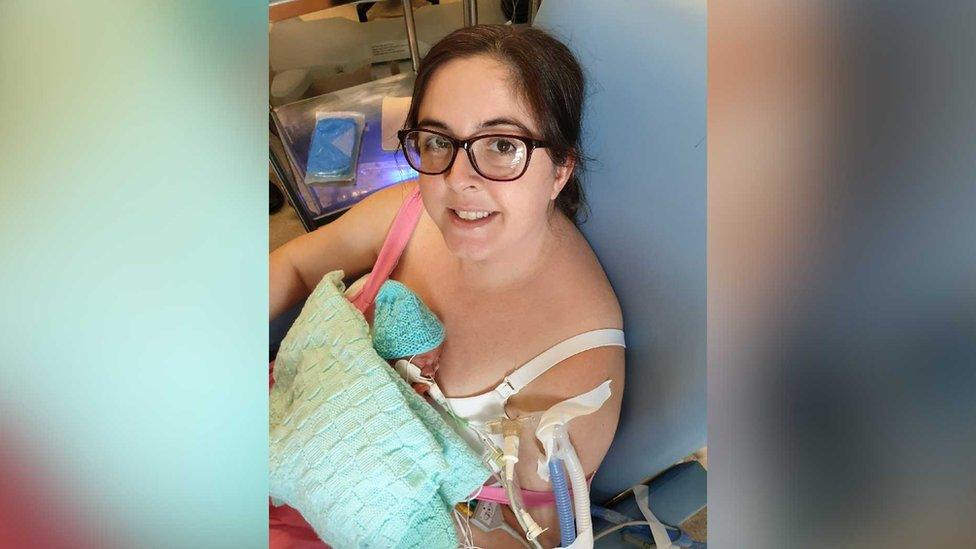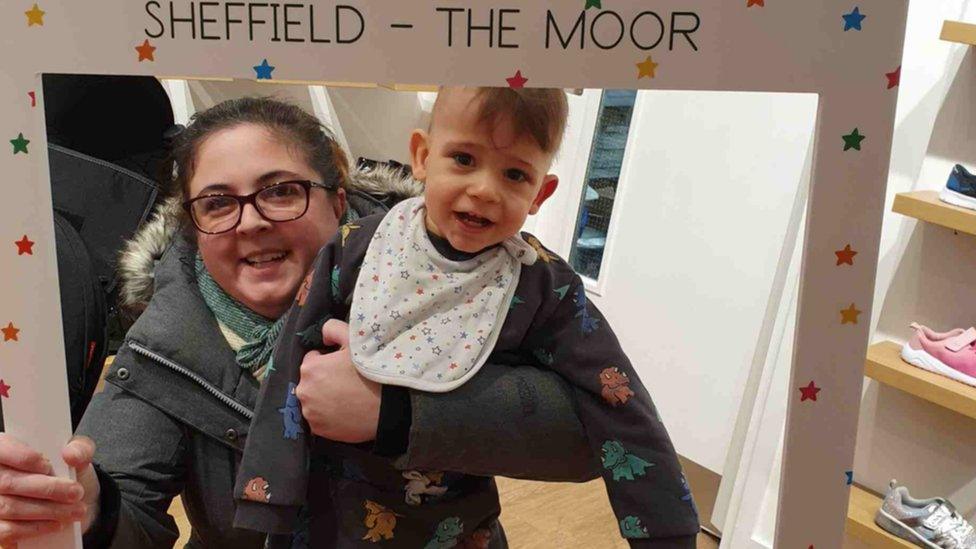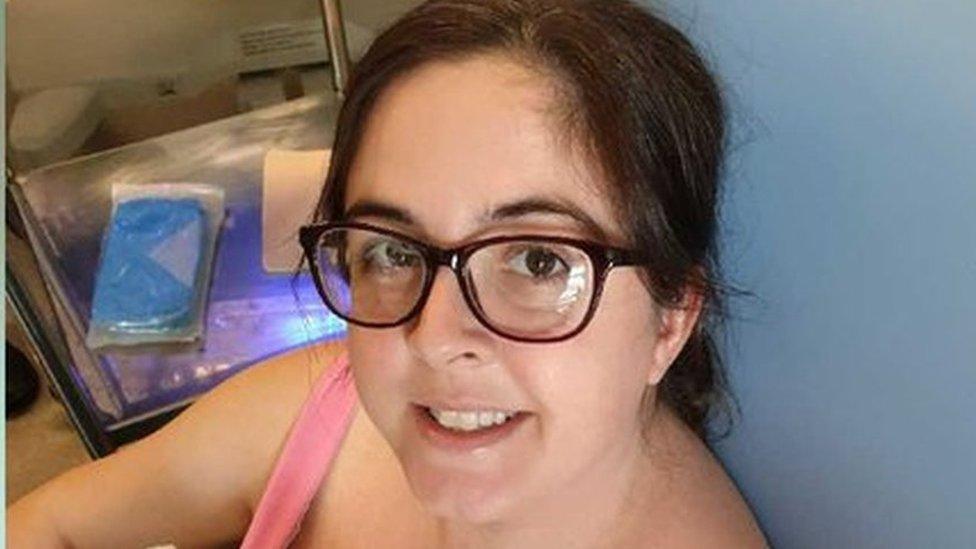Sheffield woman's blood clot death was preventable, inquest finds
- Published

Natasha Hewitt's husband Nick said she was "loving and caring" and had made his life "complete"
The death of a woman who died from multiple blood clots could have been prevented, a coroner has ruled.
Natasha Hewitt, 35, from Sheffield, died on 17 December in 2022.
Prior to her death she had complained of "migraine-like" symptoms and had sought advice from her GP, NHS 111 and visited a walk-in centre.
An inquest at Sheffield's Medico-Legal Centre heard that there were "missed opportunities" in Mrs Hewitt's care and that neglect contributed to her death.
Mrs Hewitt's family said they felt "let down on several occasions".
Assistant Coroner Marilyn Whittle was told the mum-of-one had a history of blood clots associated with pregnancy but on this occasion her symptoms were initially mistaken for an ear infection.
Advanced Clinical Practitioner, Nazakat Hussain, told the inquest Mrs Hewitt did not disclose her history of blood clots when he saw her at the walk-in centre in Sheffield.
He explained to the court that walk-in centres were unable to access patient records.
Mr Hussain said the symptoms described to him at the time were "common signs of an infection inside the ear".
Mrs Hewitt was prescribed antibiotics, but her condition worsened the next day, her husband said.
The coroner was told she called NHS 111, which was staffed by Yorkshire Ambulance Service employees.
The call handler did not record Mrs Hewitt's headache and gave the impression they were "maybe not listening", the inquest heard.
'Gross failure'
Deputy head of nursing and quality assurance for 111, Lynsey Hodgson, told the court: "Natasha said yes three times [when asked about having a headache].
"I am so sorry it was answered no [on the system].
"We need to do a lot more investigating to find out why that happened."
Ms Hodgson said that if the headaches had been recorded it was "more likely than not" that Mrs Hewitt would have been taken to hospital that day.
The coroner was told Mrs Hewitt's GP was sent notes of her visit to the walk-in centre and the 111 call, which to him indicated "a nasty ear infection".
In hindsight, Dr Michael Taylor said he wished he had not purely relied on notes from others and had called his patient.
He told the inquest Mrs Hewitt's death had influenced changes to the triaging system at Upperthorpe Medical Centre where she had been a patient.
As Mrs Hewitt's condition worsened an ambulance was called on 16 December and she was taken to hospital.

Natasha Hewitt with her son after he was born prematurely
CT scans revealed she had multiple blood clots in her brain.
Surgeons attempted to remove them but when her condition did not improve, they tried to relieve pressure on her brain by removing part of her skull.
Mrs Hewitt died in surgery at Sheffield's Royal Hallamshire Hospital.
Returning her conclusion, Ms Whittle said that, on the balance of probabilities, Mrs Hewitt could have survived.
She said: "In this case Natasha was dependent on the health care professionals. There was a failure to provide basic medical care."
Selecting the wrong category during the 111 call amounted to "gross failure", she said, adding that there had been "missed opportunities" to send Mrs Hewitt to hospital.
She concluded that Mrs Hewitt had died from cerebral venous sinus thrombosis which was contributed to by neglect.

Natasha and her son during their last shopping trip together
Speaking at the inquest, Mrs Hewitt's grandfather, David, told the court: "We as a family feel Natasha was let down on several occasions and the people who let her down have cost this family a dear person."
In a statement issued after the conclusion, her husband, Nick Hewitt, 42, said: "Natasha was the most loving and caring wife.
He said she was his "best friend" and she and their son had "made my life complete".
Yorkshire Ambulance Service declined to comment.

Follow BBC Yorkshire on Facebook, external, X (formerly Twitter), external and Instagram, external. Send your story ideas to yorkslincs.news@bbc.co.uk, external.
Related topics
- Published21 September 2023
